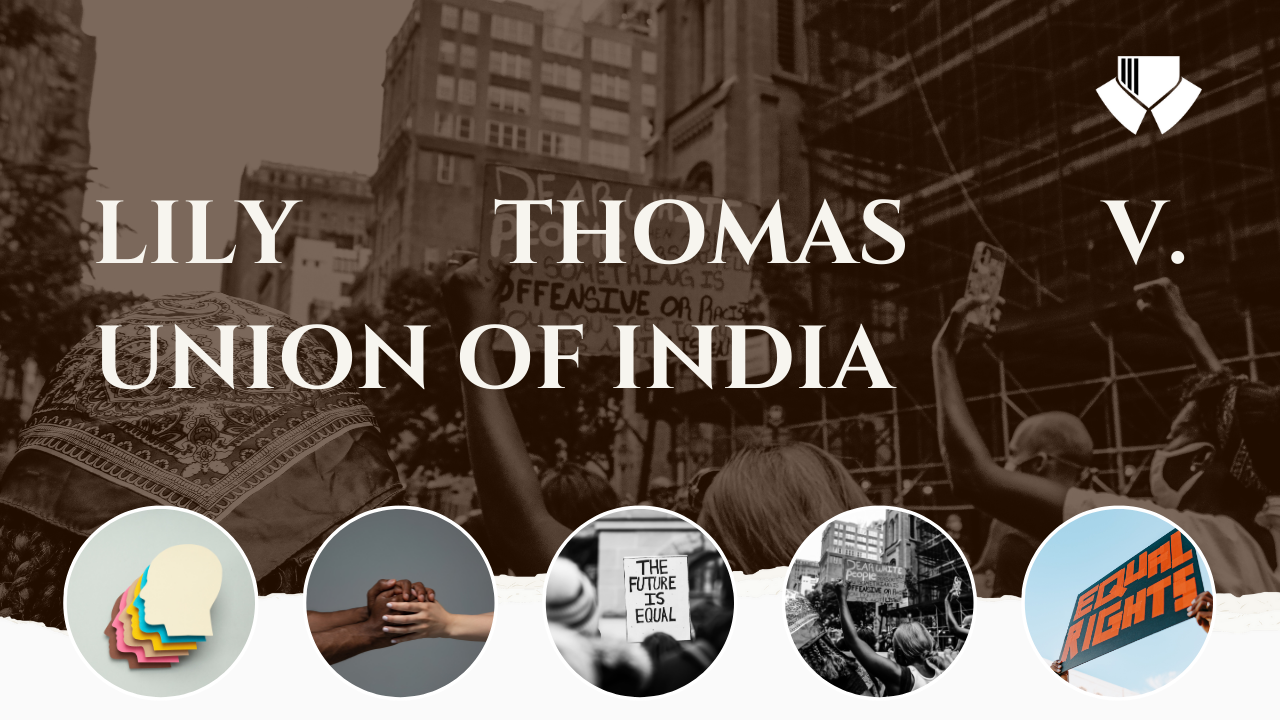This case analysis is done by Sanjeev, a law student.
Citation: AIR 2000 SC 1650
Bench: Justice Saiyed Saghir Ahmad and Justice R.P. Sethi, JJ.
Date of Judgement: 10.07.2013
Introduction
In Lily Thomas V Union of India & Ors. case, the landmark judgement was taken, the case was filed as a writ petition and it was filed as a review petition of the case Sarla Mugdal v UOI. The first issue was of the implementation of a uniform civil code as it has been envisaged by Article 44 but the problem is that if such uniformity is implemented that it would possess a direct challenge to each and every citizen right to practice and propagate their religion as it has been provided by Article 25. This was a landmark judgement because in this case only the Supreme Court took into consideration that if a man performs second marriage without divorcing his first wife and she is alive, such marriage will be void.
Facts
- Mrs. Sushmita Ghosh, who is the spouse of Mr. G.C. Ghosh (Mohd. Karim Ghazi) filed a Writ Petition against her husband expressing that she was already married to Mr. G.C. Ghosh as per the Hindu ritual on tenth May, 1984.
- Mr. G.C. Ghosh told his wife Mrs Gosh that it would be best for her if she would mutually agree for the divorce, as he had converted to Islam presuming that there would be any objection for the remarriage.
- The petitioner than talked to her father and her aunt about the same and told them that her husband is has converted from Hindu to Muslim and the reason behind this conversion is that he is going to marry someone else. They all attempted to persuade Mr G.C. Ghosh and work him out of the marriage.
- To be a matter-of-fact Mr. G. C. Ghosh has changed over to Islam exclusively with the end goal of rewedding and has no genuine confidence in Islam. He doesn’t practice the Muslim ceremonies as recommended nor has he changed his name or religion and other things.
- Mrs. Sushmita Ghosh asked the judiciary that where a non-Muslim male gets changed over to the “Muslim” religion with practically no genuine difference in conviction and simply so as to keep away from a previous marriage or go into a subsequent marriage, any marriage went into by him later transformation would be void.
ISSUES RAISED
- Whether there should be Uniform Civil Code for all citizens?
- Whether a Hindu Husband can solemnize second marriage by converting to Islam?
Contentions
Petitioner
- The first issue raised by the petitioner was that if marriage is considered to be a sacred institution, how falling back on the demonstration of religion conversation to Muslim clearly demonstrates of polygamy as Muslim individual law permits for the remarriage.
- The second marriage of the Mr. G.C. Ghosh is additionally contrary to the principals of natural justice.
- It was already appealed not just by Lily Thomas but other women of the Muslim religion as well to declare polygamy in the Muslim Law as unconstitutional.
- Petitioner contends that the conversion done by the respondent isn’t as per the Muslim Laws. For being a Muslim one should relinquish his previous religious faith however here respondent can be seen practicing his prior Hindu faith and keeps on being Hindu.
Respondents
- The respondents in all the above petitions declare a typical conflict that having accepted Islam, they can have four spouses independent.
- Since numerous things in Muslim laws are not codified, the conversion rules in the Islam religion are additionally founded on the convictions and customs which they are following for a long time. For being converted into Islamic faith, there are two fundamentals that are, he should be of sound mind and he should have given full consent for the process of conversion. Here in this case Mr. G.C. Ghosh gave his full consent.
- Furthermore, they reiterated, the Article 25 of India Constitution ensures freedom of religion. Based on this, one can explicitly change over into the other religious communicating their privileges of freedom religion given by Constitution of India.
- There is no doubt that the Hindu Marriage Act, 1955 just applies on the Hindus however the respondent has transformed into an Islamic faith. Polygamy is restricted in Hindu Laws however Muslim laws advance polygamous nature of marriage up to four spouses.
- The respondent requested honourable court to pass such an order or decree lifting all the charges levelled against the respondent and dismissing all the pleas and petitions filed by the petitioners.
Judgement
- Justice S. Sagir Ahmad stated that if a party has a living life partner and he contracted or endeavour to contract second marriage then such marriage would be invalid and void under Section 11 of Hindu Marriage Act, 1959. The Hon’ble Court additionally expressed that; the subsequent marriage solemnized by the Hindu during the resource of first marriage is void.
- Freedom ensured under Article 25 should not be used misappropriate which doesn’t encroach the religious right guaranteed.
- Muslim law does allow second marriage in India, simply for the sake of marriage you can’t solemnize the subsequent marriage by changing over the religion.
- The conversion of religion performed by Mr. Gosh is not according to Muslim Law The second marriage performed by Mr. Gosh will be considered void under section 11 of Hindu Marriage Act as Mr. Gosh has not performed the conversion according to Muslim Law the sections 494 and 495 of Indian Penal Code mentioned in section 17 of the Hindu Marriage Act, 1955 is applicable.
- Article 44 says that there should be a uniform civil code, though article 44 is not under the fundamental right it is a directive principles of state policy (DPSP). While framing laws one should keep in mind the state policies and frame laws accordingly.
Conclusion
Taking this judgement was quite important as men started to convert their religion with just the intention of performing second marriage, Bigamy is an offence of having more than spouse when the first spouse is alive and such bigamous relationship and marriages are illegal and void ab intio.
In today’s time everyone talks about equality and demands for it, however one can observe the distinctions with respect to similar matter in two diverse personal laws.


